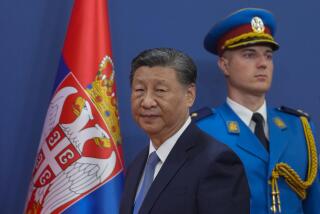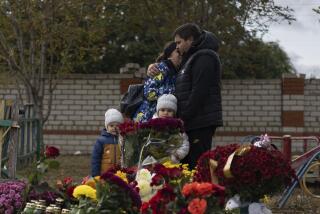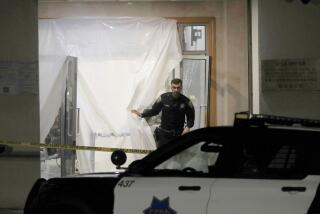Time for Targeting Review
- Share via
The NATO bombs that smashed the Chinese Embassy in Belgrade and a hospital in the city of Nis have, in that cold phrase favored by NATO’s military briefers, further degraded the alliance’s claims of a precision air war in Yugoslavia, and recklessly so at a moment when there had been signs of progress toward a diplomatic solution to the conflict. Spokesmen said faulty intelligence led to the bombing of the embassy, claiming that the building was thought to be a munitions depot. What blew up was any shred of Chinese support in finding a solution to the air war, now in its seventh week.
Demonstrations against the U.S. Embassy and consulates in China flared. At the United Nations, Chinese officials demanded an immediate end to the bombing, calling the NATO campaign barbaric, but they failed to persuade the Security Council to condemn the misguided attack. Nevertheless, this new blunder promises to stall significant diplomatic moves.
Russian President Boris N. Yeltsin called the embassy bombing “a blatant outrage” and canceled a planned three-day diplomatic foray to Britain by his foreign minister, Igor S. Ivanov. That means valuable diplomatic momentum has been lost. But in a positive move on a different level, Russia’s special envoy on the Balkans, Viktor S. Chernomyrdin, has flown to Bonn for talks that will include Ibrahim Rugova, a moderate leader of the Kosovo Albanians with whom Yugoslav President Slobodan Milosevic has kept an open line.
Welcome contacts like these that continue to turn the focus of the crisis toward a negotiated solution should be pressed at every opportunity, with the final goal remaining the safe and monitored return of all refugees to their homes in Kosovo, protected by an international force. Negotiations have shown that the most effective multinational force would have a Russian component.
Amid the diplomatic efforts, errant targeting by the directors of NATO’s bombing campaign clearly has become a problem and one that Milosevic will try to use to his advantage in any attempts to bring the war to an end. To the pilots’ credit, most NATO attacks have been clean and effective, but every cleanly executed raid is diminished by a blunder that knocks out a passenger train or hits a hospital.
NATO spokesmen offered “deep regrets” for the fatalities and to those wounded in the misguided attacks, but apologies alone are not sufficient. It is in NATO’s interest to immediately review its targeting procedures. This air war is designed to sap the strength of the Yugoslav military forces and the industrial machine that supports them. How that put the Chinese Embassy on Saturday’s target list is a mystery, one that NATO must promptly solve if efforts toward a diplomatic resolution of the war are to succeed.
More to Read
Sign up for Essential California
The most important California stories and recommendations in your inbox every morning.
You may occasionally receive promotional content from the Los Angeles Times.













